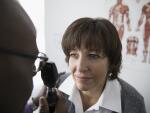
Wet age-related macular degeneration, also called wet AMD, is a chronic eye disease that affects older adults. It develops when abnormal blood vessels leak fluid or blood in your macula, the part of your eye that provides you with sharp, central vision. As a result, wet AMD can cause blurry or dark spots to appear in the middle of your visual field. Wet AMD can get worse over time and may lead to permanent vision loss. But there are a number of treatments available to slow this process, and in some cases, even improve your vision.
Injections are commonly used to treat wet macular degeneration.
A protein found in your eye called vascular endothelial growth factor (VEGF) plays a role in stimulating the growth of the abnormal blood vessels under your macula. Newer anti-VEGF injections have been developed to block this protein and slow the progression of wet AMD. They are usually the first line of treatment and have greatly improved the outlook for individuals with wet AMD.
After your eye is anesthetized, the medication is injected into the white portion of your eye using a very small needle. Available medications include:
- Ranibizumab (Lucentis)
- Bevacizumab (Avastin)
- Aflibercept (Eylea)
- Brolucizumab (Beovu)
Injections are given once every few weeks to once every few months. Individual response to any particular medication can vary, so your ophthalmologist will work with you to select the most appropriate treatment.
Photocoagulation and photodynamic therapy can seal leaky blood vessels.
Photocoagulation uses high-energy scattered laser spots that treat areas of retina affected by leaky abnormal vessels. It induces a sponge-like effect and can be repeated if necessary. The focal laser also causes vessels to seal and stop growing, slowing progressive vision loss. However, scarring and permanent blind spots can occur in the treated area, so the amount and location of abnormal vessels need to be taken into consideration to determine if you are a proper candidate for the procedure. You may need to have the procedure repeated if new blood vessels grow.
With photodynamic therapy, your doctor injects a drug called verteporfin (Visudyne) into your vein. The drug travels and attaches to molecules found in the abnormal blood vessels under your macula. A special low-powered laser is then aimed at the vessels. Because the drug is sensitive to light, the laser activates it and causes the blood vessels to close. Multiple treatments may be required since the blood vessels can reopen over time.
Low vision rehabilitation can help you manage wet AMD.
If wet AMD is making it difficult for you to carry out normal tasks, like reading or recognizing faces, talk to your doctor about low vision rehabilitation. While it won’t treat the disease itself, it can make it easier to live with. A specialist in the field can provide you with ways to maximize the vision you still have and better manage your daily activities. You may be taught ways to modify your environment to stay safe or learn how to use devices with magnification to make things easier to view.
New treatments for wet macular degeneration may still be coming.
Based on the success seen with anti-VEGF injections, researchers are studying new and longer-lasting drugs, such as abicipar, which would require fewer office visits but provide the same therapeutic effect as current medications. Also, port delivery systems are under investigation. This involves implanting a small device into your eye that would slowly release an anti-VEGF medication over time. This would allow you to skip the regular doctor’s appointments for injections.
Gene therapies are another potential wet AMD treatment. Researchers have found that injections of certain genetic materials may allow your eyes to create anti-VEGF therapy within themselves, rather than require regular injections of a medication. Gene therapy could potentially provide treatment for many years at a time.
Living with wet AMD and associated vision loss can be challenging, but big strides have been made in its treatment—with more coming down the pipeline. Reach out to your ophthalmologist regarding any of your treatment questions or concerns.


















